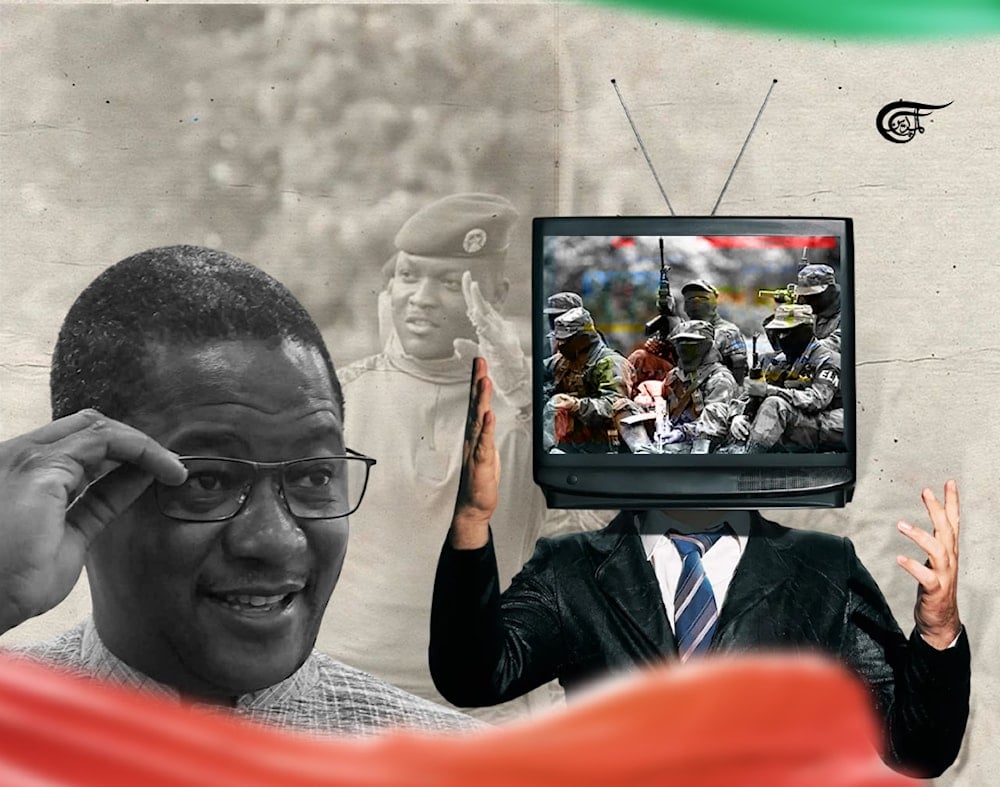Communications warfare against AES
Minister Traoré only appealed to the UN agencies because the UN - of which Burkina Faso is a member - is expected to exercise greater discernment when confronted with unverified reports and alleged facts.
-

Terminology used by the media, NGOs, and most international agencies is far from neutral (Illustrated by Batoul Chamas; Al Mayadeen English)
The terminology used by the media, NGOs, and most international agencies is far from neutral when they talk about the history, events, organization, or political and social movements of the South. However, many Western peoples have naturalized this supremacist way of speaking, while the peoples of the South have the anti-colonial task of not allowing themselves to be influenced by this naturalization brought about by the cultural domination of the West.
This is the task that led Minister K. Jean Marie Traoré, Minister of Foreign Affairs, Regional Cooperation and Burkinabe Abroad (Affaires étrangères, de la Coopération régionale et des Burkinabè de l'extérieur) to suggest that these agencies should be more careful with the terminology used to address Burkina Faso's affairs. The minister pointed out that these agencies refer to terrorists as ‘groupes armés non étatiques’ (non-state armed groups). In turn, they use similar euphemisms to refer to security groups working with the national army, whether they are contracted by the government or volunteers for the people's self-defense, thus placing legitimate and sovereign national security on the same level as terrorist aggressor groups. Not only in Burkina Faso, but throughout Africa, Western agencies define African actors and their wars - armed rebels, armed militias, tribal wars - differently than they would if they were talking about European affairs.
The Islamists who have been attacking the country for the past ten years must be described as terrorists. To put it simply, no Western country would call the terrorists ‘rebels’ or ‘armed groups’, and those whom the attacked government recruits to defend itself against these terrorists are called ‘militias’.
«The use of the term ‘militia’ to designate our courageous Volunteers for the Defence of the Fatherland (VDP) is unacceptable,» Minister Traoré said, because these people, however contradictory they may be, are above all «Burkinabe citizens who have voluntarily and courageously committed themselves to defending the integrity of their country. They are driven by the hope that one day they will live freely and with dignity in their homeland.» The minister concludes that Burkina Faso «cannot accept a confusion of terminology which, under the cover of euphemism, distorts the reality of the tragedy experienced by our people and gives a form of legitimacy to the perpetrators of these atrocities.»
It is indeed striking that major international NGOs report significantly more cases – proven or not – of crimes allegedly committed by national armies than they do of verified crimes committed by terrorist groups, Western states engaged in warmongering interventions, or states aligned with the collective West. This is especially the case when it comes to countries that refuse to submit to Western political, economic, and cultural interests and domination, as is the case in Burkina Faso since 2022.
Thus, for example, Human Rights Watch in 2024 and so far in 2025 has 25 communiqués on its website concerning Burkina Faso, of which 16 denounce and accuse the army and the government, while only 9 denounce terrorist attacks. However, these nine communiqués do not focus on the terrorists but rather on the government and the army, which reject France's ‘aid’, despite the fact that they are unable to protect their population. This is a striking balance considering that Burkina Faso has suffered the highest number of deaths caused by terrorist attacks, according to the Global Terrorism Index 2025, which measures the impact of terrorism, averaged over the last five years.
Similarly, the justice minister of neighbouring and allied Mali - ranked No. 4 among the countries most affected by terrorism - recently issued a statement echoing these sentiments, denouncing the lack of impartiality and «the instrumentalisation and politicisation of human rights by certain international organisations.» Major NGOs are eager to criticize the actions of Mali's justice system and government but make no reference to the terrorist attacks they face, according to the minister.
The Solenzo events
All this is brought up because last March, three major French agencies, AFP, RFI and Jeune Afrique, released a series of videos that allegedly showed massacres of ‘dozens of civilians’ in the town of Solenzo, in western Burkina Faso, committed by the national army and several local brigades of the Volunteers for the Defence of the People (VDP) on March 11. As is often the case, videos and ‘information’ from these agencies - speculating about the involvement of the army and the VDP in the area - went viral across global social media platforms.
The big NGOs, including several UN agencies, were remarkably quick to produce reports full of words like «seems to be», «apparently», «although we have not been able to confirm»… even supporting the allegation made by the three commercial news agencies that everything shown in the videos «seemed to be» «ethnic repression against the Peul» or Fulani.
The Burkina government immediately sent a delegation to the area to investigate what had happened and, after checking, issued several communiqués denying all accusations and reporting a completely opposite story to the one told by the AFP, RFI, and Jeune Afrique.
The Burkina Faso authorities claimed that the videos were fabricated and that the public prosecutor's office has opened an investigation to locate those responsible. In addition, the government has launched a campaign calling on the population not to be fooled by manipulation aimed at sowing division and hatred, on several fronts: From the Higher Council for Communication, the Public Prosecutor's Office, the National Coordination of Citizen Vigilance Associations, even from the religious front, with Imam Tiégo Tiemtoré and the representative of the Christian community, Moïse Balma, praying together on the occasion of Eid al-Fitr, and calling on the population to ‘remain vigilant to avoid falling into instrumentalisation and ethnic and religious divisions’.
Conclusion
Minister Traoré only appealed to the UN agencies because the UN - of which Burkina Faso is a member - is expected to exercise greater discernment when confronted with unverified reports and alleged facts.
Moreover, the minister gave a masterclass in cultural anti-colonialism by diplomatically expressing his ‘regret’ at the inappropriate use of the aforementioned terminology, using very similar euphemisms to refer to aggressors and the attacked, as well as fallaciously inciting the public to draw conclusions that have not yet been proven.
These euphemisms and fallacies are used with the intention of «colonizing intelligence by deforming the word», as Julio Cortázar would say. Language is not neutral because the language used in this way to the point of exhaustion is a devastating weapon in the communicational war against subjugated countries and, above all, against those that decide to no longer bow to Western domination, as the Alliance of Sahel States or AES has done.

 Rosa Moro
Rosa Moro
 7 Min Read
7 Min Read









